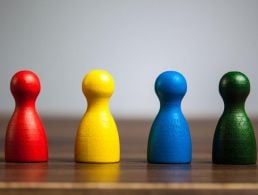Wearing a face mask remains important during the Covid-19 pandemic, but a new study has shown ways it could negatively affect your social interactions.
Mask wearing has become second nature for many of us since the Covid-19 pandemic began. Whether you’re working in an office, commuting on public transport or going to the shop, various activities still require us to wear a face covering to protect ourselves and others.
However, if you find it tricky to pick up on social cues when you can’t see another person’s face, a new study may have found the reasons why.
Hiding half of the face with a mask could negatively impact our ability to socially interact and share other people’s emotions, according to a study from Cardiff University, assisted by researchers from Queen’s University Belfast.
If you’ve noticed a difference in your interactions when you have a mask on, these findings may benefit you at work or when you’re out and about.
Facial imitation
People naturally imitate the facial expressions of those they’re interacting with in order to recreate the emotional experience of the other person, according to Dr Ross Vanderwert of Cardiff University’s School of Psychology.
“This facial mimicry, where the brain recreates and mirrors the emotional experience of the other person, affects how we empathise with others and interact socially.”
He said that wearing a mask impacts our ability to do facial mimicry, which can affect our ability to share emotions and detect positive social interactions.
“Wearing a face mask continues to be vital to protect ourselves and others during the Covid-19 pandemic, but our research suggests this may have important implications for the way we communicate and interact,” Vanderwert added.
Neural mirroring
In the study, the brains of 38 people were monitored while they watched videos of fearful, happy and angry expressions, as well as a collection of inanimate everyday objects, as a control.
During the study, participants watched half of the videos while holding a pen between their teeth, and the rest of the videos with nothing in their mouth.
This was done to investigate neural mirroring, the activity in our motor system for our own actions when observing other’s actions. This can facilitate hand-eye coordination tasks and complex tasks like understanding the emotions of others.
Dr Magdalena Rychlowska from the Queen’s University Belfast School of Psychology said: “This mirroring or simulation of another person’s emotions may enable empathy, however, up until now the neural mechanisms that underline this kind of emotion communication have been unclear.”
The study found a difference in neural mirroring when participants had the pen in their teeth compared to when they could move their mouth freely.
“Our findings suggest that processing faces is a very challenging task and that the brain may need more support from, and rely more heavily on, our own faces to support the visual system for understanding others’ emotions,” Rychlowska noted.
Harder to detect certain emotions
Another interesting point of the study was the difference in observing positive emotion or negative emotion.
When participants had the pen in their teeth, no neural mirroring was observed when looking at the happy and angry expressions. However, it was detected when they looked at fearful expressions.
“For emotions that are more heavily expressed by the eyes, for example fear, blocking the information provided by the mouth doesn’t seem to affect our brain’s response to those emotions,” Rychlowska stated.
“But for expressions that depend on the mouth, like a friendly smile, the blocking had more of an effect.”
Don’t miss out on the knowledge you need to succeed. Sign up for the Daily Brief, Silicon Republic’s digest of need-to-know sci-tech news.




